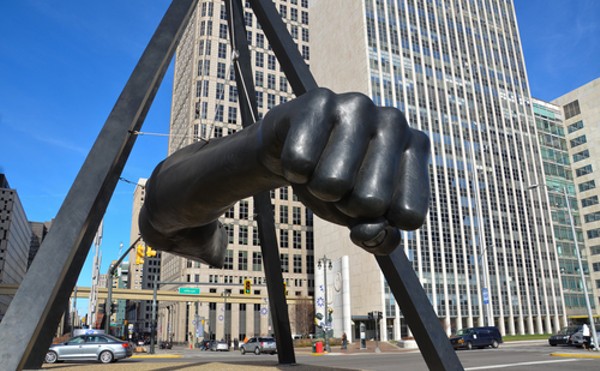Fourteen years ago this week an event happened that was so momentous it can’t possibly be overstated. East Germany threw open the Berlin Wall. If you never saw the wall in person, it was considerably more horrifying than television made it seem.
Actually, it was two walls, with machine-gun towers and barbed wire and a whole heavily land-mined nine yards in between. The East German government, which threw up the wall overnight in 1961 to prevent most of its population from simply walking out of the country, offered words that would do Attorney General John Ashcroft proud.
They said it wasn’t built to suppress freedom, but to keep the people safe. In fact, its official name was “the anti-fascist protection wall.” But the Communists forgot the words of their own Ilya Ehrenburg, who wrote “if the whole world was covered with asphalt, a crack would form in the asphalt, and in that crack, grass would grow.”
Some people here persuaded themselves that the people who lived behind the wall were basically content. But when the crack came, the first woman over was asked by reporters where she was from, and she spat, “The zone,” as in occupation zone, and anyone who heard her knew that East Germany was a corpse.
Yet the crack was many years in coming, and many died trying to scale that wall or crash through it or tunnel under it. Many in other lands have fought so hard and so long for freedom because the United States stood as a beacon to those who would be free. Yet there are those even in this country who would erect walls and build prison camps to lock up those they fear.
Freedom is a precious thing, as Anthony Romero knows. Matter of fact, this is the only nation based on a guarantee of freedom, and Romero, the national executive director of the American Civil Liberties Union, has as his full-time job seeing that we live up to our Constitution.
Regardless of your politics, there is not a more patriotic institution in the country, no matter what lies and filth are spewed into the media. Once upon a time, presidents publicly praised the ACLU. Today, Ashcroft has become the first attorney general in modern times to refuse to meet with the nation’s foremost defender of our values.
Last weekend, Romero came to Detroit for the first time to speak at the ACLU’s annual dinner, and I had breakfast with him. I had long wanted to meet Anthony Romero. The child of impoverished Puerto Rican refugees, he grew up in housing projects before winning a scholarship to Princeton, and then going on to Stanford University law school.
Romero, now just 38, was running the Ford Foundation’s human rights and international cooperation program when he was recruited to succeed the legendary Ira Glasser as head of the ACLU.
Naturally, most of the press coverage I saw focused not on any of this, but on the fact that he was openly gay, though occasionally “first Latino” was also thrown in.
When he took over, he had an experience that is close to the very definition of baptism under fire. His maiden speech was to a group of generous donors. “I was all set to give a basically optimistic speech about new horizons, new challenges, hopeful optimism from the new kid on the block,” when an aide suggested he step out into the hall. “Not now!” he said.
Yes, the reply came, now. There was a TV in the hall, and it was a little past 9 a.m. on the morning of Sept. 11, 2001.
“Someday I will give that speech,” he grinned. Instead, he steeled his audience for the challenges ahead. They have been thorny challenges — worse, in some ways, than he had feared. “If you would have told me that someone would have seriously proposed arresting American citizens for whatever reasons and holding them without trial and without access to counsel, I never would have believed it,” he said, shaking his head.
Nor did he expect anything like the assault on our basic rights and freedoms. With the possible exception of Richard Nixon, he cannot remember any president whose war on civil liberties has been as “relentless and insatiable.” (I am considerably older than Romero, and my clear impression is that these guys are worse than Nixon.)
Romero listened to prominent congressmen and senators say they were afraid to vote against the first Patriot Act, regardless of what was in it. And he was scared to death this summer when the blackout came, for he was convinced at first it was terrorism.
“I started planning just what I would do and say,” when the next great assault on civil liberties came. Romero formulated his plan as he walked down 82 flights of stairs and more than 50 blocks to get home from his office. Fortunately, the power outage seems to have merely been one more ignored wake-up call from our decaying national infrastructure.
Not everything, however, is gloomy. Membership in the ACLU has skyrocketed since Sept. 11, growing this year to nearly 400,000 nationally. Twice as many new members are signing up as did before, and the average age has fallen too.
“And I really think we’ve turned a corner with Congress,” he added.
Now, he says, he’s hearing more members of Congress saying we may have gone too far in encroaching on people’s freedoms. To the administration’s chagrin, a leaked copy of a proposed Patriot Act II found heavy criticism and scant support last spring.
Result: It was never formally introduced ... at least not yet.
“Safe and free,” Romero says with a grin. “That’s our slogan. And you can’t have one without the other.”
Jack Lessenberry opines weekly for Metro Times. E-mail [email protected]




